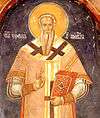Jefrem (patriarch)
| Saint Jefrem | |
|---|---|
| Serbian Patriarch[1] | |
|
Fresco of Jefrem from the Monastery of Peć | |
| Church | Serbian Orthodox Church |
| See | Monastery of the Patriarchate of Peć |
| Installed | 1375; 1389 |
| Term ended | 1379; 1392 |
| Predecessor | Sava IV; Spiridon |
| Successor | Spiridon; Danilo III |
| Personal details | |
| Born |
ca. 1312 Balkans |
| Died |
1400 Serbia |
| Buried | Monastery of Peć |
| Denomination | Eastern Orthodoxy |
| Residence | Monastery of the Patriarchate of Peć |
| Sainthood | |
| Feast day | June 15/28 |
| Canonized |
1407 by Patriarch Sava V |
Jefrem (Serbian Cyrillic: Јефрем; Ephraem; ca. 1312–d. 1400), also known as Elder Jefrem (старац Јефрем), was the Patriarch of the Serbian Orthodox Church twice, in 1375–79 and 1389–92, and a poet.
Born into a priestly family, of Bulgarian origin,[a] he became a monk in ca. 1335 at 23 years of age.[2] He moved to Mount Athos, and stayed at Hilandar, and later at Zograf and as a hesychastic ascetic in the mountains of Athos.[2] He left Athos in ca. 1347 for a monastery on a river island of the Maritsa near Plovdiv where he became a hegumen.[2] He then moved to Serbia, and stayed in the Monastery of the Patriarchate of Peć.[2] He lived in a cave-church near Visoki Dečani. Patriarch Sava IV built an ascetic cell for him in Ždrelo near the Monastery of Peć. When unrest broke out in the state and Church, the Synod chose Jefrem to succeed as patriarch on 3 October 3 1375. He managed to save the Church from interference from feudal lords by renouncing his throne and turning it over to Spiridon, and became an ascetic. Following the death of Spiridon in 1389, Jefrem again took office. However, he once again renounced the throne in 1392, and then retired to Ždrelo. He died in the evening of 14 June 1400, and was buried the next day at the Monastery of Peć.[3] According to the hagiography of Jefrem, Sava V was present at the burial.[4] Jefrem left a large original poetry work, preserved in a 14th-century manuscript from Hilandar.[5]

In 1406 or 1407 ("seven summers after ascendance") he was proclaimed a saint by Sava V after showing signs of sainthood.[3] Bishop Marko wrote the Service to St. Jefrem and Life of St. Jefrem. His feast day is celebrated on June 15/28, together with St. Lazar and St. Spyridon.
Annotations
Historiography treat him as being of Bulgarian origin.[2][5] Another source claim that he was from Thessaly.[6]
References
- ↑ Leontije Pavlović (1965). Kultovi lica kod Srba i Makedonaca: Istorijsko-etnografska rasprava. Narodni Muzej.
<--ЈЕФРЕМ, ПАТРИЈАРХ (умро 1400. г.) У житију се назива „свети отац наш Јефрем патријарх",1) а у служби „преподобии и богоносни Јефрем патријарх српски".2)-->
- 1 2 3 4 5 Gavrilović 1981, p. 14.
- 1 2 Popović & Skerlić 1941, p. 206.
- ↑ Историјски часопис 33 (1986): Historical Review 33 (1986). Istorijski institut. 1 August 1987. pp. 21–. GGKEY:580S3RBJUZP.
- 1 2 Dimitrije Bogdanović; Milorad Pavić (1991). Stara srpska književnost. Dosije. p. 162.
- ↑ Pajsije Svetogorac (2005). Sveta Gora i Svetogorci. Manastir Svetog prvomučenika i arhiđakona Stefana.
Sources
- Books
- Purković, Miodrag (1976). Srpski patrijarsi Srednjega veka. Srpska pravoslavna eparhija zapadnoevropska.
- Gavrilović, Slavko (1981). Istorija srpskog naroda. 2. Srpska književna zadruga.
- Journals
- Vizantološki institut (2006). Recueil de travaux de l'Institut des études byzantines. 43. Vizantološki institut, SANU. pp. 116–120.
- Popović, Bogdan; Skerlić, Jovan (1941). Srpski književni glasnik. 62.
| Religious titles | ||
|---|---|---|
| Preceded by Sava IV |
Serbian Patriarch 1375–79 |
Succeeded by Spiridon |
| Preceded by Spiridon |
Serbian Patriarch 1389–92 |
Succeeded by Danilo III |
